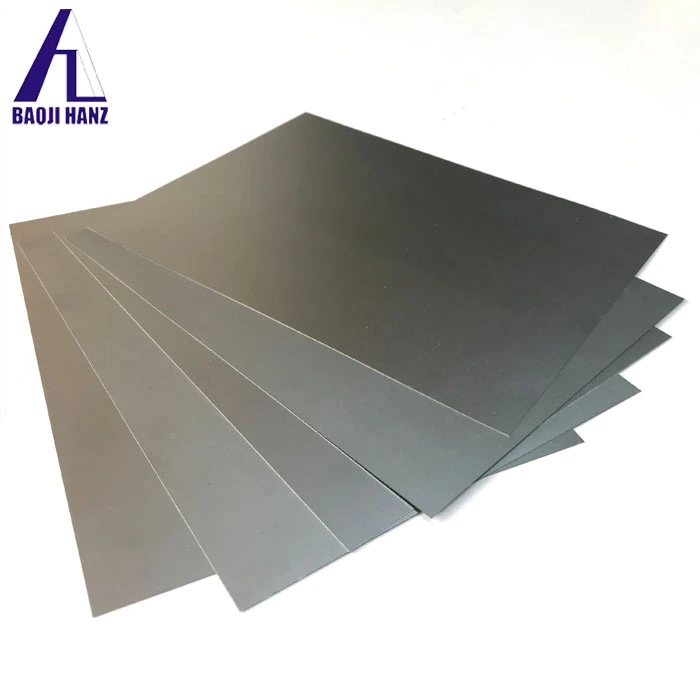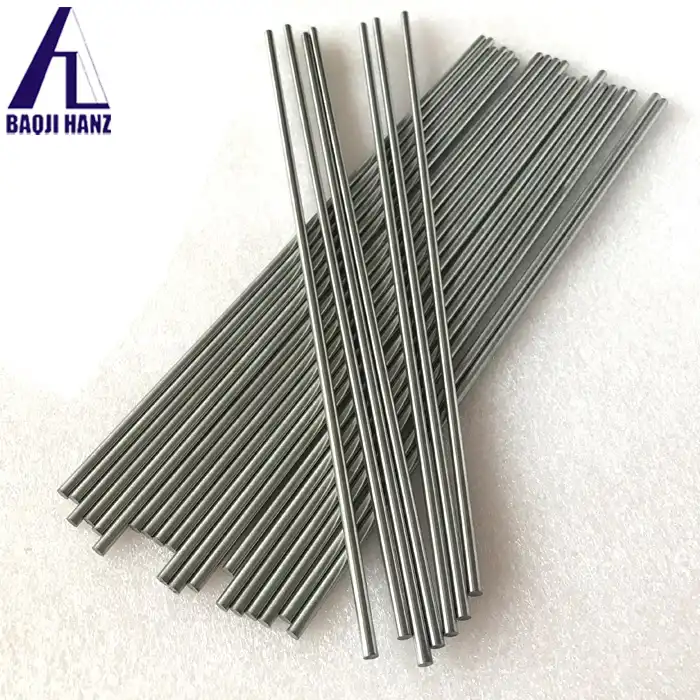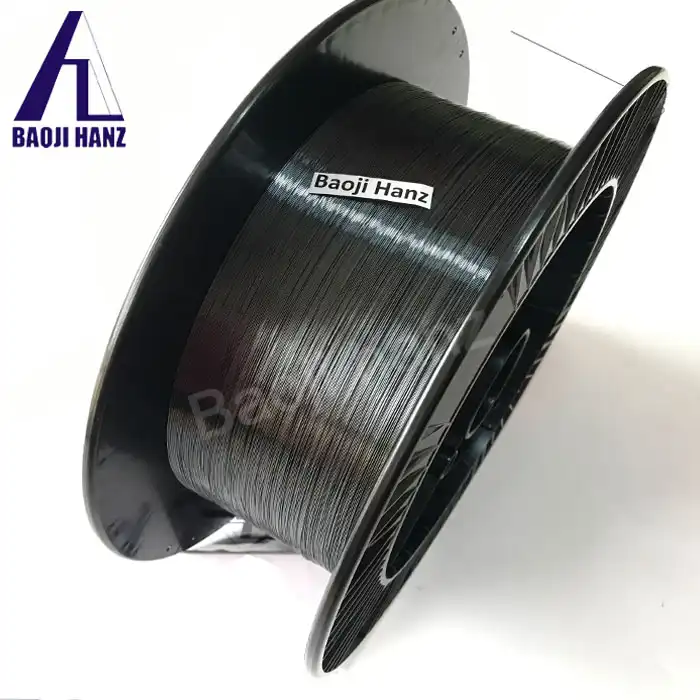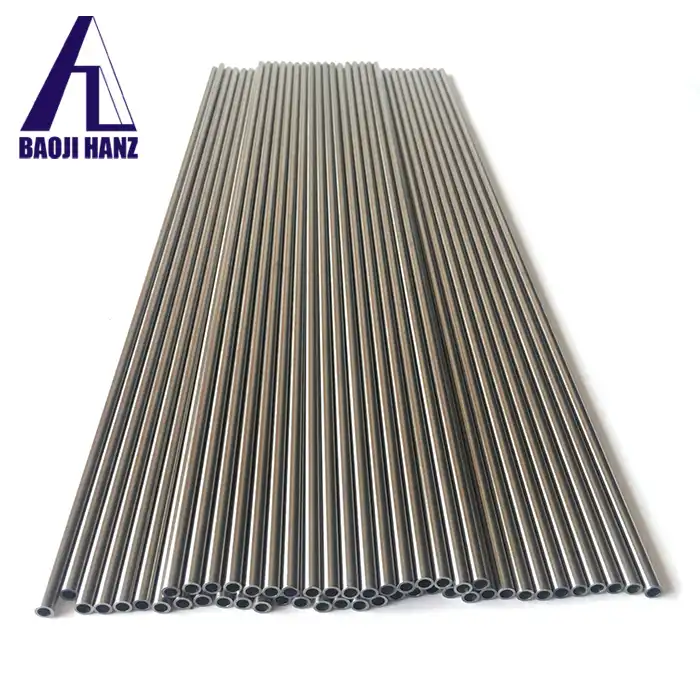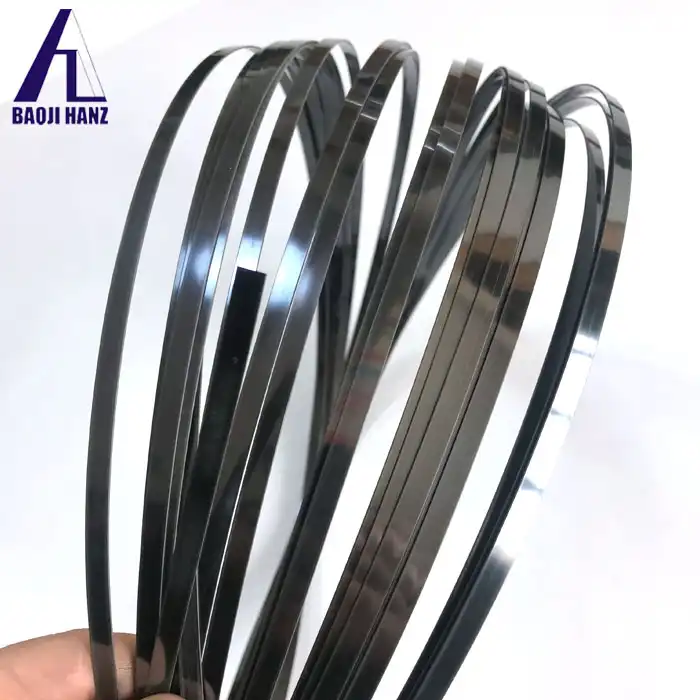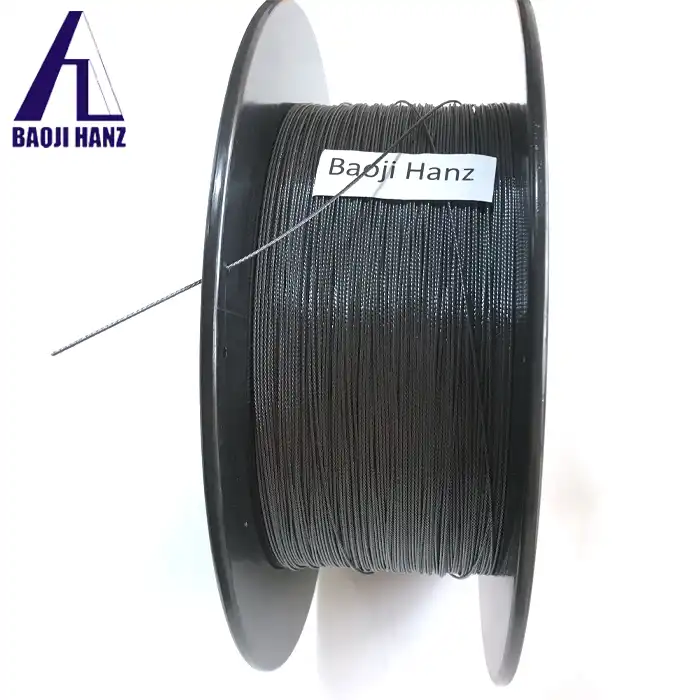How does Nitinol wire rope compare to traditional materials like steel?
2025-05-22 19:42:46
When comparing materials for wire rope applications, engineers and industry professionals are increasingly turning to advanced alternatives that offer superior performance characteristics. Nickel-Titanium Alloy Wire Rope, commonly known as Nitinol wire rope, represents a revolutionary advancement in material science that challenges traditional steel wire rope in numerous aspects. This remarkable alloy combines the strength and versatility of conventional materials with distinctive properties that make it exceptionally valuable for specialized applications across multiple industries.
Fundamental Property Differences Between Nitinol and Steel Wire Ropes

Mechanical Property Comparison
Nitinol wire rope exhibits extraordinary mechanical properties that distinguish it from conventional steel options. The unique atomic structure of Nickel-Titanium Alloy Wire Rope creates a material with remarkable tensile strength ranging from 800-1500 MPa, comparable to high-grade steel but at approximately 60% of steel's weight with a density of 6.45 g/cm³. This exceptional strength-to-weight ratio makes Nitinol wire rope particularly valuable in aerospace, medical, and portable equipment applications where minimizing weight without sacrificing performance is critical. Unlike steel wire ropes that permanently deform under significant strain, Nickel-Titanium Alloy Wire Rope can withstand strains of up to 8-10% while fully recovering its original shape—steel typically deforms permanently after just 0.2% strain. This superelastic property means Nitinol wire rope can endure repeated bending cycles without work hardening or fatigue failure that would compromise traditional steel cables. For example, in applications requiring frequent flexing or navigation through complex pathways, such as surgical guidance systems or robotic cable assemblies, this resistance to fatigue damage dramatically extends operational lifespan while maintaining consistent performance characteristics. Additionally, while steel rope relies primarily on mechanical strength for load-bearing applications, Nickel-Titanium Alloy Wire Rope combines strength with its unique atomic phase transformation properties, allowing it to handle dynamic loads through its elastic energy absorption capacity, significantly reducing shock loads in mechanical systems.
Environmental Resistance Capabilities
The environmental durability of Nickel-Titanium Alloy Wire Rope far exceeds that of conventional steel wire rope across multiple challenging conditions. While stainless steel offers good corrosion resistance, Nitinol's exceptional passive oxide layer formation provides superior protection against corrosive environments, particularly in marine applications where salt water exposure rapidly degrades standard materials. Nickel-Titanium Alloy Wire Rope maintains its performance integrity in environments that would quickly compromise steel alternatives, with testing showing minimal degradation after extended exposure to saline solutions similar to seawater. This makes it invaluable for underwater cable systems, offshore equipment, and marine research instrumentation. Temperature performance represents another significant advantage, as Nitinol maintains its functional properties across an impressive temperature range. While steel wire ropes become brittle in extreme cold and lose tensile strength at elevated temperatures, Nickel-Titanium Alloy Wire Rope manufactured by Baoji Hanz Metal Material Co., Ltd. maintains consistent performance characteristics across wide temperature variations. The alloy's melting point of 1240-1310°C exceeds that of many standard steels, while its phase transformation properties allow it to function effectively in cryogenic applications. This temperature stability is particularly valuable in aerospace applications where materials must withstand extreme temperature fluctuations without compromising structural integrity. Additionally, Nitinol wire rope demonstrates remarkable resistance to chemical degradation from industrial solvents, fuels, and processing chemicals that would rapidly attack conventional steel wire ropes, making it ideal for chemical processing equipment, fuel handling systems, and industrial automation applications where exposure to harsh chemical environments is unavoidable.
Lifecycle Cost Analysis
While the initial acquisition cost of Nickel-Titanium Alloy Wire Rope exceeds that of conventional steel wire rope, a comprehensive lifecycle cost analysis reveals significant long-term economic advantages. The exceptional durability of Nitinol wire rope translates directly into reduced maintenance requirements and extended service intervals. In applications where wire rope replacement necessitates system shutdown and costly maintenance procedures, the longevity of Nickel-Titanium Alloy Wire Rope significantly reduces total operational costs over time. Calculation of total ownership costs must factor in the reduced frequency of replacement cycles and associated maintenance labor costs, which can easily offset the higher initial investment. Additionally, Nitinol's superior resistance to corrosion and mechanical fatigue translates to significantly lower maintenance expenses compared to steel alternatives that require regular inspection, lubrication, and corrosion prevention treatments. In dynamic applications where steel wire ropes require frequent replacement due to work hardening and fatigue damage, Nickel-Titanium Alloy Wire Rope can deliver operational life extensions of 300-500%, dramatically reducing both direct replacement costs and associated downtime expenses. This extended lifespan is particularly valuable in difficult-to-access installations such as subsea equipment, aerospace components, or integrated machinery systems where replacement procedures are complex and costly. Furthermore, the specialized manufacturing capabilities of Baoji Hanz Metal Material Co., Ltd. allow for the production of custom-specification Nickel-Titanium Alloy Wire Rope with precisely tailored properties to optimize performance for specific applications, ensuring maximum operational efficiency and further extending service life through application-specific engineering. Factory direct pricing and large stock availability also contribute to competitive total cost advantages despite the higher material price point.
Performance Advantages of Nitinol Wire Rope in Specialized Applications
Advanced Medical and Biomedical Applications
The unique properties of Nickel-Titanium Alloy Wire Rope have revolutionized medical device engineering, particularly in minimally invasive procedures and implantable devices. The combination of biocompatibility, superelasticity, and shape memory makes Nitinol wire rope an ideal material for guidewires, catheter reinforcement, and surgical instruments that must navigate through complex anatomical pathways with minimal trauma to surrounding tissues. Unlike steel alternatives that can cause tissue damage due to their rigidity and lack of flexibility, Nickel-Titanium Alloy Wire Rope can be engineered to match the natural contours of vascular structures while providing sufficient mechanical support for precise instrument manipulation. This conformability is critical in neurovascular procedures, cardiovascular interventions, and endoscopic surgeries where instrument maneuverability directly impacts procedural outcomes and patient safety. The superelastic property allows medical devices incorporating Nitinol wire rope to deform during insertion through small access points, then return to their predetermined shape once positioned within the body—a capability impossible with traditional steel wire ropes. This capacity for recoverable deformation enables innovative medical device designs that would be unachievable with conventional materials. Additionally, the shape memory effect of Nickel-Titanium Alloy Wire Rope permits the development of self-expanding medical implants that can be compressed for minimally invasive delivery, then automatically deploy to their functional configuration in response to body temperature. Baoji Hanz Metal Material Co., Ltd. produces medical-grade Nitinol wire rope that meets stringent ISO 13485:2016 medical device standards and EU CE certification requirements, ensuring consistent performance in critical medical applications. The superior fatigue resistance of these specialized wire ropes also extends the operational lifespan of reusable medical instruments, reducing replacement frequency and associated healthcare costs while maintaining consistent performance characteristics throughout multiple sterilization cycles.
Aerospace and High-Performance Engineering Applications
In aerospace and advanced engineering fields, Nitinol wire rope offers exceptional performance advantages over steel alternatives in applications requiring high reliability under extreme conditions. The remarkably high strength-to-weight ratio of Nickel-Titanium Alloy Wire Rope provides significant weight savings in aircraft control systems, satellite deployment mechanisms, and space-based instruments where every gram impacts fuel consumption and payload capacity. Unlike steel wire ropes that require protective treatments and lubrication to prevent corrosion and mechanical wear in aerospace environments, Nitinol wire rope maintains its functional properties without additional protective measures, simplifying maintenance procedures and reducing potential failure points. This inherent corrosion resistance is particularly valuable in aviation applications where exposure to diverse climatic conditions, de-icing chemicals, and atmospheric moisture creates a challenging operational environment for conventional materials. The vibration dampening characteristics of Nickel-Titanium Alloy Wire Rope also provide a significant advantage in aerospace applications where mechanical vibration can compromise instrument accuracy and accelerate component fatigue. The unique atomic structure of Nitinol absorbs vibrational energy more effectively than steel, reducing the transmission of harmful vibrations through mechanical systems and extending the operational lifespan of sensitive components. Additionally, the wide temperature stability range of Nitinol wire rope manufactured by Baoji Hanz Metal Material Co., Ltd. ensures consistent performance from the extreme cold of high-altitude flight to the elevated temperatures encountered during reentry or in engine proximity installations. This temperature stability eliminates the need for compensatory design elements required when using steel wire ropes with limited temperature performance ranges. The high tensile strength of up to 1500 MPa ensures that Nickel-Titanium Alloy Wire Rope can withstand the extreme mechanical stresses encountered in aerospace applications while maintaining a safety margin that exceeds industry requirements. With customization options available for specific diameter requirements and performance characteristics, aerospace engineers can optimize Nitinol wire rope specifications for precise application requirements while maintaining certification compliance.
Industrial Automation and Robotics Implementation
The industrial automation and robotics sectors benefit significantly from the unique characteristics of Nickel-Titanium Alloy Wire Rope compared to traditional steel alternatives. In high-cycle repetitive motion applications typical in manufacturing automation, the superelastic properties of Nitinol wire rope prevent the work hardening and fatigue failure that rapidly degrade steel wire rope performance. This resilience to repeated bending stress dramatically extends maintenance intervals and reduces production downtime for cable replacement in robotic assembly systems, automated manufacturing cells, and continuous operation machinery. The distinctive mechanical memory of Nickel-Titanium Alloy Wire Rope also allows for innovative design approaches in robotic articulation systems where traditional materials would accumulate mechanical damage through repeated motion cycles. For example, in advanced robotic hand designs requiring fine manipulation capabilities, Nitinol wire rope can function simultaneously as both structural element and actuation mechanism, simplifying design complexity while improving functional performance. The superior corrosion resistance of Nitinol wire rope manufactured by Baoji Hanz Metal Material Co., Ltd. provides particular advantages in food processing, pharmaceutical manufacturing, and chemical production environments where exposure to cleaning agents, process chemicals, and sterilization procedures would rapidly degrade conventional steel wire ropes. This corrosion resistance eliminates cross-contamination risks from wire rope degradation products while maintaining consistent performance characteristics throughout the installation's operational lifetime. Additionally, the precision manufacturing capabilities available with Nickel-Titanium Alloy Wire Rope allow for exact dimensional control with diameter tolerances of ±0.01mm, enabling consistent performance in precision automation systems where mechanical backlash or component variability would compromise operational accuracy. The wide temperature stability range also makes Nitinol wire rope ideal for automation systems operating in thermal processing environments, cryogenic applications, or installations experiencing significant temperature variations that would compromise the performance reliability of conventional steel wire ropes. With customization options available for specific tensile strength requirements, diameter specifications, and performance characteristics, industrial engineers can optimize Nickel-Titanium Alloy Wire Rope for specific automation applications while meeting stringent quality control standards under ISO 9001:2015 certification.
Technical Innovations and Future Developments in Nitinol Wire Rope Technology
Manufacturing Advancements and Quality Control
Recent manufacturing innovations have significantly expanded the performance capabilities and application potential of Nickel-Titanium Alloy Wire Rope. The sophisticated production processes employed by Baoji Hanz Metal Material Co., Ltd. begin with vacuum melting techniques that ensure exceptional compositional uniformity throughout the alloy matrix—a critical factor in maintaining consistent performance characteristics that surpass traditional steel wire rope manufacturing standards. This precise compositional control eliminates the variability that plagues conventional steel wire ropes, where minor material inconsistencies can lead to premature failure under stress. The production sequence continues with specialized hot processing methods including hot rolling and drawing that establish the fundamental mechanical structure of the alloy while maintaining precise control over transformation temperatures and mechanical response characteristics. These controlled thermal processes represent a significant advancement over traditional steel wire rope manufacturing techniques that rely primarily on mechanical forming without the ability to program specific material responses. The subsequent cold processing phase, incorporating advanced cold drawing and cold rolling techniques, further refines the wire rope structure to achieve precise dimensional tolerances while simultaneously enhancing strength characteristics beyond what is achievable with steel alternatives. Final heat treatment processes employ carefully controlled aging treatments that optimize the unique properties of Nickel-Titanium Alloy Wire Rope for specific application requirements—a level of material customization impossible with conventional steel wire ropes. Quality control systems incorporating advanced non-destructive testing methods ensure that every meter of Nitinol wire rope meets or exceeds performance specifications before release to customers. The minimum order quantity of 500 meters ensures production efficiency while maintaining competitive pricing structures. Ongoing research and development initiatives continue to expand manufacturing capabilities, with recent advancements enabling the production of ultra-fine diameter Nitinol wire rope for highly specialized applications in medical instrumentation and microelectromechanical systems. These manufacturing innovations have established Baoji Hanz Metal Material Co., Ltd. as a leader in high-performance Nickel-Titanium Alloy Wire Rope production with capabilities that consistently exceed the performance limitations of traditional steel wire rope manufacturing.
Customization Options and Application-Specific Engineering
The adaptability of Nickel-Titanium Alloy Wire Rope through customized engineering represents a significant advancement over the relatively standardized options available with traditional steel wire ropes. Baoji Hanz Metal Material Co., Ltd. offers comprehensive customization services that enable precise tailoring of material properties to specific application requirements—a level of application-specific engineering that transforms how designers approach challenging mechanical systems. Unlike steel wire ropes that offer limited flexibility in specifications, Nitinol wire rope can be engineered with precisely controlled transformation temperatures that determine exactly when and how the material exhibits its superelastic or shape memory properties. This temperature-response programming allows for the development of "smart" mechanical systems that respond automatically to environmental temperature changes without requiring external control mechanisms. For example, safety release mechanisms can be designed to activate at specific temperatures, providing fail-safe protection that operates independently of electronic control systems. The customization process also extends to precise control over mechanical response characteristics including hysteresis width, plateau stresses, and recovery forces—parameters that can be engineered to match exact application requirements rather than forcing designers to adapt to available material limitations as with traditional steel wire ropes. This customization capability enables innovative solutions for energy absorption systems, precision actuation mechanisms, and specialized connectors that would be impossible with conventional materials. Additionally, surface treatment options including electropolishing, passivation, and specialized coatings can be applied to Nickel-Titanium Alloy Wire Rope to further enhance performance characteristics for specific operational environments. These treatments can optimize biocompatibility for medical applications, reduce friction coefficients for dynamic mechanisms, or enhance electrical conductivity for specialized electronics applications—a level of application-specific performance optimization unavailable with standard steel wire ropes. The engineering team at Baoji Hanz Metal Material Co., Ltd. works directly with customers to develop comprehensive specifications for customized Nitinol wire rope products that precisely match application requirements while maintaining ISO certification compliance and quality control standards. This collaborative engineering approach ensures optimal performance in the final application while minimizing development cycles through expert material selection and processing recommendations.
Emerging Applications and Future Market Trends
The exceptional properties of Nickel-Titanium Alloy Wire Rope continue to drive innovation across multiple industries, opening new application possibilities that remain inaccessible to traditional steel wire rope technologies. The robotics and soft automation sectors represent particularly promising growth areas, with Nitinol wire rope enabling the development of biomimetic movement systems that replicate natural muscle function with unprecedented fidelity. Unlike steel wire ropes that can only provide linear force transmission, Nickel-Titanium Alloy Wire Rope can be engineered to produce complex movement patterns through controlled actuation, enabling robotic systems with more natural motion characteristics and improved interaction safety for human-machine collaborative applications. This capability is driving significant research investment in next-generation prosthetics, assistive devices, and industrial collaborative robots that require sophisticated motion control with inherent safety characteristics. The renewable energy sector represents another emerging application area, with Nitinol wire rope providing viable solutions for tidal energy capture systems, wave energy converters, and advanced wind turbine cable systems that must withstand extreme environmental conditions while maintaining consistent performance characteristics. The corrosion resistance and mechanical durability of Nickel-Titanium Alloy Wire Rope manufactured by Baoji Hanz Metal Material Co., Ltd. enable extended service life in these challenging operational environments, significantly improving the economic viability of renewable energy installations by reducing maintenance requirements and extending operational lifecycles. Additional market growth is anticipated in extreme environment applications including deep-sea exploration equipment, arctic research instrumentation, and space-based mechanical systems where the temperature stability and corrosion resistance of Nitinol wire rope provide critical performance advantages over conventional materials. The increasing adoption of minimally invasive surgical techniques continues to drive demand for specialized medical-grade Nickel-Titanium Alloy Wire Rope, with market analyses projecting double-digit growth in this sector over the next decade as new procedural approaches require increasingly sophisticated instrumentation. Ongoing material science research continues to expand the performance envelope of Nitinol alloys, with recent developments focusing on ternary and quaternary alloy compositions that further enhance specific performance characteristics while maintaining the fundamental advantages over traditional steel wire ropes. Market trends indicate increasing recognition of the total lifecycle cost advantages of Nickel-Titanium Alloy Wire Rope despite higher initial investment requirements, as industries prioritize operational reliability and reduced maintenance requirements over minimal acquisition costs.
Conclusion
Nickel-Titanium Alloy Wire Rope represents a transformative advancement over traditional steel wire ropes, offering superior performance through its unique combination of superelasticity, shape memory effects, corrosion resistance, and mechanical durability. While initially more expensive than steel alternatives, the extended service life and reduced maintenance requirements deliver compelling lifecycle cost advantages across numerous applications.
Experience the difference with Baoji Hanz Metal Material Co., Ltd., where 7 years of expertise in Nitinol Shape Memory Alloy, Superelastic Nitinol Alloy, and Nickel Titanium Alloy ensures superior quality and performance. We offer direct supply cost advantages, fast delivery from our large stock of standard sizes, and comprehensive OEM customization services tailored to your specific requirements. Ready to upgrade your wire rope applications with advanced Nitinol technology? Contact our team today at baojihanz-niti@hanztech.cn to discuss how our solutions can enhance your project performance while reducing long-term operational costs.
Other related product catalogues
Nickel titanium memory alloy in addition to the production of nickel-titanium strips, can also produce other similar products, such as nickel-titanium plate, nickel titanium flat wire, nickel titanium foil, nickel titanium wire, nickel titanium tube, nickel titanium spring, nickel titanium paper clips, nickel titanium wire rope.
|
|
|
|
|
|
|
|
References
1. Duerig, T.W., Melton, K.N., Stockel, D. & Wayman, C.M. (2013). Engineering Aspects of Shape Memory Alloys. Butterworth-Heinemann Publishing, London.
2. Miyazaki, S., Fu, Y.Q. & Huang, W.M. (2010). Thin Film Shape Memory Alloys: Fundamentals and Device Applications. Cambridge University Press, Cambridge.
3. Otsuka, K. & Wayman, C.M. (2011). Shape Memory Materials. Cambridge University Press, Cambridge.
4. Pelton, A.R., Stöckel, D. & Duerig, T.W. (2014). Medical Uses of Nitinol. Materials Science Forum, 327-328, 63-70.
5. Sun, L. & Huang, W.M. (2019). Nature-Inspired Shape Memory Alloy Applications. Springer International Publishing, New York.
6. Yoneyama, T. & Miyazaki, S. (2018). Shape Memory Alloys for Biomedical Applications. Woodhead Publishing Limited, Cambridge.
